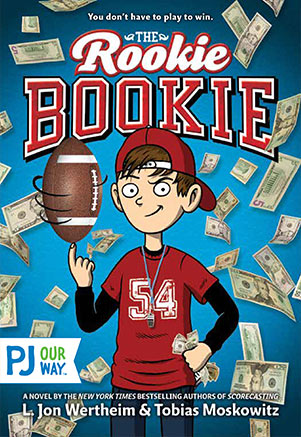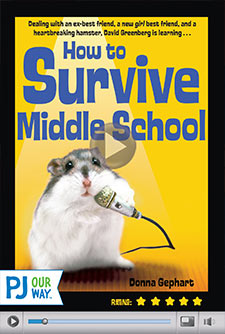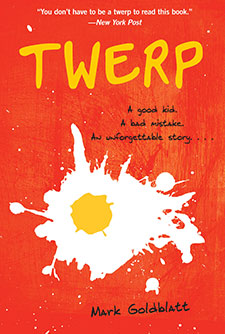The Rookie Bookie
Mitch loves making money and Jamie loves sports. They’re onto a scheme that could earn them a fortune! Or get them into big trouble. Or both.
Average Rating
( hint: Login to leave a review! )
181 Reviews
Leave Review
What the Book is About
Jewish Content & Values
Positive Role Models
Content Advisory
Talk it Over!
More for You
What the Book is About
Seventh grader Mitch is new to town and he’s trying to fit in. He’s a numbers whiz with a flair for business, but he soon finds himself in over his head in a money-making scheme that could get him into big trouble. Will Mitch realize that money doesn’t buy happiness? University of Chicago behavioral economist Tobias Moskowitz and Sports Illustrated writer John Wertheim have scored one for the middle grade team with this super clever, fun, and educational story.
Jewish Content & Values
Jamie, Mitch’s best friend, is Jewish. She wears a Magen David necklace, her home has a mezuzah on the doorpost, and she’s preparing for her Bat Mitzvah. She’s open about her identity and talks with Mitch about how tough it is, sometimes, to be the only Jewish kid at their middle school.
Positive Role Models
- Mitch learns a lot about the real value of money and how to be a good friend from his experience. He tries to help his parents with their financial difficulties and ultimately uses his considerable talents for good.
- Jamie is a faithful friend and a strong female character who stays true to herself, despite pressure from her parents to embrace gender stereotypes.
Content Advisory
There’s some trash talk on and off the football field, and some kids say words like “crap” and “suck” as they insult each other’s sports skills in creative ways. Mitch’s dad, an aging hippie, refers to girls as “foxes” and although Mitch and Jamie’s relationship is not a romantic one, other kids assume she’s his girlfriend.
Talk it Over!
When Mitch’s mom hears about the gambling scheme, she asks Mitch, “Couldn’t you tell that if you were doing something you had to tell so many lies about, it must be wrong?” What were some other clues that should have let Mitch and Jamie know that what they doing was wrong?
More for You
Although the Torah does not explicitly prohibit gambling, it’s frowned upon as a source of primary income. According to Jewish law, a compulsive gambler cannot serve as a valid witness (Sanhedrin 24b-25a). The passage specifically refers to those who “play the dice” and “race pigeons,” but the concept was extrapolated to include all games of chance. In the sixteenth century, card games were so popular that many Jews became addicted, inspiring the rabbis of Venice to ban gambling entirely on threat of excommunication. Today, indulging in the occasional game of chance (or sports betting) is generally accepted.
What the Book is About
What the Book is About
Seventh grader Mitch is new to town and he’s trying to fit in. He’s a numbers whiz with a flair for business, but he soon finds himself in over his head in a money-making scheme that could get him into big trouble. Will Mitch realize that money doesn’t buy happiness? University of Chicago behavioral economist Tobias Moskowitz and Sports Illustrated writer John Wertheim have scored one for the middle grade team with this super clever, fun, and educational story.
Jewish Content & Values
Jewish Content & Values
Jamie, Mitch’s best friend, is Jewish. She wears a Magen David necklace, her home has a mezuzah on the doorpost, and she’s preparing for her Bat Mitzvah. She’s open about her identity and talks with Mitch about how tough it is, sometimes, to be the only Jewish kid at their middle school.
Positive Role Models
Positive Role Models
- Mitch learns a lot about the real value of money and how to be a good friend from his experience. He tries to help his parents with their financial difficulties and ultimately uses his considerable talents for good.
- Jamie is a faithful friend and a strong female character who stays true to herself, despite pressure from her parents to embrace gender stereotypes.
Content Advisory
Content Advisory
There’s some trash talk on and off the football field, and some kids say words like “crap” and “suck” as they insult each other’s sports skills in creative ways. Mitch’s dad, an aging hippie, refers to girls as “foxes” and although Mitch and Jamie’s relationship is not a romantic one, other kids assume she’s his girlfriend.
Talk it Over!
Talk it Over!
When Mitch’s mom hears about the gambling scheme, she asks Mitch, “Couldn’t you tell that if you were doing something you had to tell so many lies about, it must be wrong?” What were some other clues that should have let Mitch and Jamie know that what they doing was wrong?
More for You
More for You
Although the Torah does not explicitly prohibit gambling, it’s frowned upon as a source of primary income. According to Jewish law, a compulsive gambler cannot serve as a valid witness (Sanhedrin 24b-25a). The passage specifically refers to those who “play the dice” and “race pigeons,” but the concept was extrapolated to include all games of chance. In the sixteenth century, card games were so popular that many Jews became addicted, inspiring the rabbis of Venice to ban gambling entirely on threat of excommunication. Today, indulging in the occasional game of chance (or sports betting) is generally accepted.





